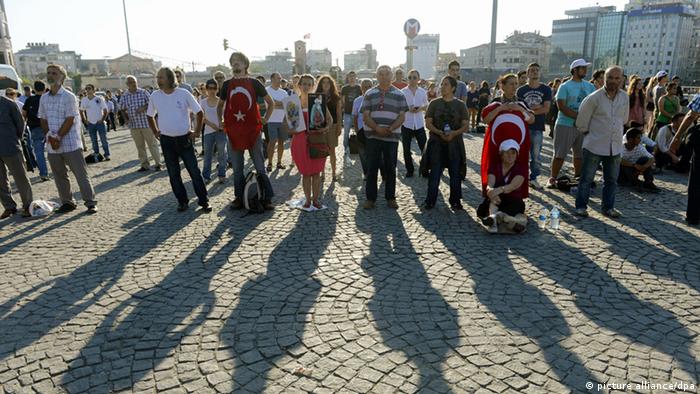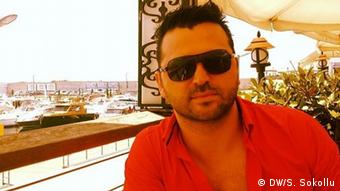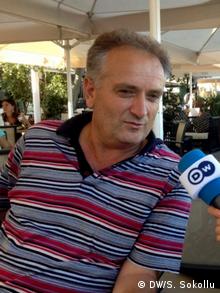In Turkey, migrants from the Balkans have traditionally supported Prime Minister Erdogan. But it looks as if the forced clearance of Gezi Park may have cost the Prime Minister some of that support.
Recep Tayyip Erdogan's speech in Istanbul on June 16 was in effect a response to the anti-government protests. The Turkish Prime Minister addressed hundreds of thousands of supporters the day after police used water cannons and tear gas to clear Gezi Park of protesters.
"I want you to shout so loudly that Sarajevo and Zenica can hear you," Erdogan told the audience, and saluted the people of Macedonia and Kosovo as well. Many Turkish Muslims in the Balkans have long been staunch supporters of Erdogan's conservative AKP party. His political and economic involvement in the region has usually won him their votes in the past.
Esat Günay, whose ancestors left Bosnia for Turkey more than 50 years ago, says the Balkans are still very important to them. "If the people there are content, we are content. We're pleased that Erdogan involves the Balkans," he says.
NGOs in Macedonia support Erdogan
Two days ahead of Erdogan's speech in Istanbul, members of the Turkish minority in Gostivar, a Macedonian town the Turkish premier has already visited twice, organized an event in support of Erdogan. Their motto: "Erdogan, don't give in, the Balkans are on your side!" Ethnic Turkish representatives from neighboring countries also participated in the event.
The protests in Turkey were, they say, "initiated by agitators who want to topple the powers in the Turkish Republic." The umbrella association for the Turkish NGOs in Macedonia had previously issued a press release that described the demonstrators as part of a group that was "opposed to affluence in the Muslim community," and wanted to "damage Turkey's stability."
Greeks in Istanbul are critical
But not everyone is happy about Turkey's influence in the Balkans. Its support for Turkish businesses in Bosnia, Turkmenistan and the Arab states mainly has political reasons, according to 32-year-old Bosniak Erdogan Erdem. "They cooperate with the Islamic community: they're buying it so that one day they can use it," he warns. Turkey is particularly active in Bosnia, Erdem says: "They're deceiving the poor with the help of religion."
Gamze Gencebay, 30, runs a Bosnian specialty shop in Istanbul's Pendik neighborhood, where many Bosniaks live. Her parents come from the Sandshak region of southern Serbia, which is settled mainly by Muslims. The young woman fears the wave of protests could split Turkish society. While Erdogan always gave Bosniaks the feeling that they belonged to society, Gencebay says he did "the exact opposite" in the way he handled the demonstrations. She sees it as intolerant.
Enver Demir, another Bosniak whose parents emigrated to Istanbul from the Sandshak in 1958, is also critical of Erdogan's style of government. Demir, who manages a Balkan sports club in Istanbul, is convinced that Erdogan's efforts to persuade people in the Balkans to support him politically are doomed. Religion and politics shouldn't mix, he says. "Faith is for people, and not for politics. They want to get people on their side by using religion. That is something most of us do not support."
Istanbul is also home to more than 3,000 Greeks: the minority known as the 'Rum,' who are Greek Orthodox Christians with a Turkish passport, and the 'Neopolites' - students, businessmen, and managers of international companies who only recently moved to Turkey.
Just a short time ago, most Greeks sided with Erdogan. In 2007 he paved the way for Greek schools that the Turkish state had unrightfully confiscated in the past to be handed back to the Greek community. Current developments, however, have divided the Greeks in Istanbul: the more conservative kept away from the protests, while the younger generation dissociated themselves from Erdogan and participated in the demonstrations in Gezi Park.
Solidarity in Bulgaria
In neighboring Bulgaria, efforts to show solidarity with the protesters in Istanbul failed. Turkish students gathered to protest in front of the Turkish Embassy in Sofia, but they were dispersed by Bulgarian police on the grounds that the protest had not been approved. Bulgaria's Foreign Ministry appealed to Bulgarians living in Turkey to refrain from participating in the demonstrations. dw de




No comments:
Post a Comment